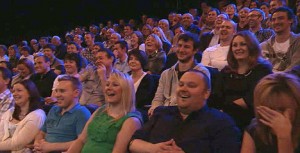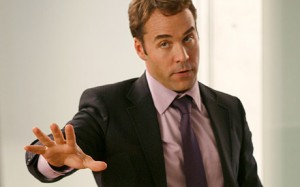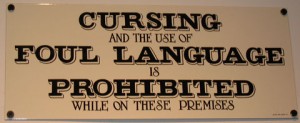Most comedians and comedy fans agree that “you wanna do well with the audience.” However, in some places, especially New York City where I perform most often, you’re performing for multiple audience types, usually at the same time. And what one audience type responds to, another may not go for as much.
Below is a list of audience types and what their main concern usually is. And of course, there are exceptions to each of these guidelines.
Choose who you play to at your own peril.

1) The Actual Audience
These are the people who have paid money and are buying drinks to watch the show. In NYC, there are a few standard types of actual audience:
- Times Square Tourists – usually from the Midwest or a foreign country and bought comedy tickets on the street as a spur of the moment activity. They tend to like safer jokes (family, relationships, etc.) with bigger act outs and minimal word play and thinking
- Greater NYC locals (NJ, CT, etc) – are okay with edgier material and some local references.
- “In The Know Tourists” – did some online research and decided on a club or specific comedian to see, closer to a NYC local than a real tourist
- College Crowd – doesn’t want to hear about your wife and kids
- High School Kids / Prom Shows – responds to politics and family topics, but can get tight about sexual material or if they’re the “cool kids” in school, it’s the opposite
- Hip Locals – aka “below 14th st” – aka “alt scene audience” – are down for dark humor and obscure pop culture references, more accepting of rambling, long setups and less punchy material
- Urban Room – a predominantly non-white audience watching a show in their neighborhood. Similar to hip locals but some material may work better/worse depending on what you look like.
- Friends of newer comedians – sometimes hate comedy, or are skeptical about the show, but were dragged out by their friend who’s attempting comedy, tend to think they paid too much for cover and drinks and sometimes are under the mistaken impression they should only laugh at their friend’s jokes to make that friend look better
2) Club Bookers
Want you to get big, consistent laughs. Also they want to make sure audience members don’t complain about your act / decide to boycott the club because of you.
3) Club Managers
Primary concern is if you’re already approved to be working there / able to do the job / nobody will ask why they put you on the show if you weren’t already schedule to be on it.
4) Club Owners
Does your name help get people in the door and sell drinks? Are you doing something unique that may pay off for them later down the line? Do you seem loyal – aka will them giving you stage time before you’re famous ensure you keep dropping by their club later in your career.
5) TV Industry / Networks / Producers
Audience response matters less than whether you have a castable look and whether they find your material funny.
6) Talent Agents and Talent Managers
Do you have talent? Do we see you being worth ten million dollars? What’s your look? Can you write?
7) Wait Staff
Are you funny and different? Do we want to watch your jokes night after night? Are you pleasant and not annoying off stage?
8) Other Comedians
This is usually the toughest audience of all, but also the audience who will get you most of your work
- Headliners – Are you funny enough and easy to hang out with for five hour car rides?
- Next level comics – Do you run a show?
- Same level comics – Are you funny and do you run a show?
- Independent producers that are comedians – Do you run your own show and are you funny?
- Newer comics – Are you funny and approachable?
Did I miss anything? Post in the comments and I’ll respond.
Wanna try stand-up comedy yourself? Consider taking my NYC Comedy Class or booking a private one-on-one comedy coaching session (in person or via Zoom)
More Stand-Up Comedy Tips:
- 10 Steps to Become a Great MC
- 3 Tips To Planning A Successful Comedy Show
- Are Any Topics Off Limits?
- Barking Tips
- Dealing With Hecklers
- Five Tips For Your Comedy Event To Run Smoothly
- How I Got 100,000 TikTok Followers In 51 Days
- How To Make Money In Comedy
- How To Put Together A Great College Comedy Show
- How To Record Your Own Comedy Album
- How To Self Publish A Book Through Kickstarter
- My Writing Process
- Not Connecting With The Audience?
- Organizing Jokes
- Overcoming Stage Fright
- Producing a Show: Getting Audience
- Producing a Show: Running The Show
- Producing a Show: The Comics
- Producing a Show: The Venue
- Ten Tips To Succeed During a Check Spot
- The 8 Different Types of Comedy Audiences
- The Pecking Order
- Treat It Like a Job
- Types of Shows for Beginners
- Types of Spots
- What To Do When Nobody Laughs
- Your First Stand Up Performance



